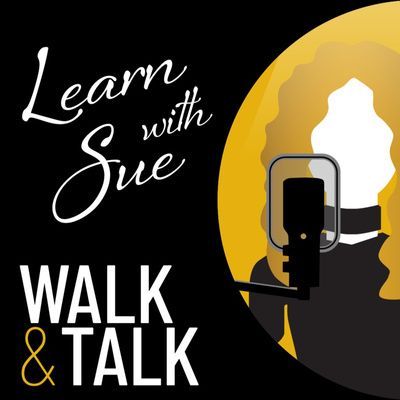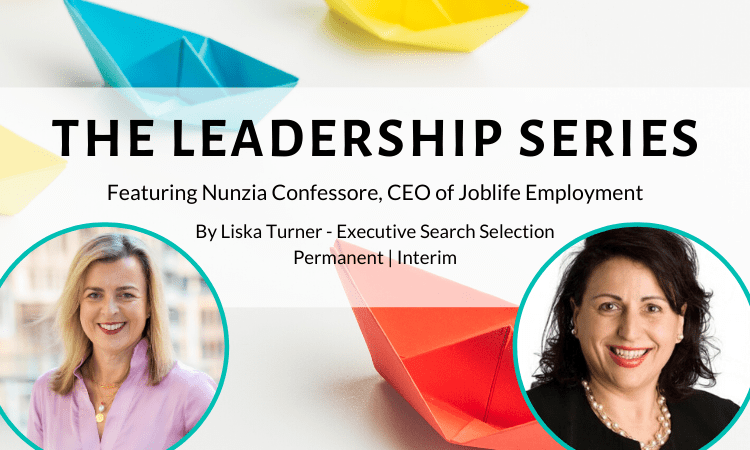The Leadership Series: Q&A With Nunzia Confessore, CEO of Joblife Employment
The Leadership Series: Leadership Observations From The Front Line
Interviews with Leaders from the For-Purpose sector with Liska Turner
Nunzia Confessore, CEO of Joblife Employment 
Nunzia has had the privilege of 25 years’ leadership experience across Australia and internationally including positions such as CEO, COO and EGM in both profit and not for profit sector across various service-based industries including employment services, recruitment, training, disability and community services. Nunzia seeks to inspire people to achieve extraordinary things with a commitment and vision to changing the lives of people with disability through gaining meaningful employment.
CEO’s lead from the front. What are the most important decisions you make as a leader of your organisation?
The decisions I make as the CEO need to be aligned to Joblife’s Vision: A job for everybody. This appropriately sets us an ambitious target embodying our aspirations, against which we can be held to account.
Now more than ever the decisions around our digital presence and technology capabilities are critical, which includes the need to support a flexible service delivery model for our clients and flexible working arrangement for our employees.
As Joblife Employment is still quite a young organisation there are a range of key decisions that are still being made to set good foundations for a successful future. These can range from growth strategies, hiring decisions to scoping technology projects linking back to the Joblife Strategy and taking into consideration emerging opportunities and challenges.
In light of COVID-19 what have you done differently? Have your staff needed a different style of leadership from you?
Normally, I would describe myself as a visionary leader who motivates people to follow and work towards our vision. Whereas in this current Coronavirus crisis I have had to incorporate a more directive style in order to help staff feel safe, secure in their jobs, productive and remain focused in a time of turmoil.
During COVID-19 there has been an increased presence from me for all employees. We have daily Zoom meetings with the Executive team, weekly Zoom Meetings with the regional leaders and a separate weekly All Staff Zoom Meeting to ensure our staff are engaged, informing them of what is going on and that we are staying on track. I also assembled a National Response Team for the first 3 weeks that the crisis took hold and we are still meeting 2-3 times per week to manage any concerns and check the progress of new initiatives and the changing guidelines from the government relating to COVID-19.
In May I commenced a new people engagement initiative “Coffee with the CEO”. This is a 30-minute coffee catch up via Zoom that provides an opportunity for me to get to know each staff member and also ask a series of questions so that I can gain feedback and ideas on how we can collectively make the organisation greater. I am really looking forward to this series as I know we have clever people with clever ideas in our organisation.
While I have no doubt you have faced significant challenges, have there been any COVID-19 silver linings?
Absolutely. Due to the increased presence of myself and the executive team, we have seen a boost in the confidence and level of engagement of our employees to provide constructive feedback and have been given the time to reflect on processes and move towards improvement.
We have also been able to refocus and increase our marketing and communication efforts through a digital platform that supports our adapted business model not just to weather the COVID-19 storm, but to support the business strategy in the recovery period.
While more people living with a disability are finding themselves out of work, the silver lining here is that we will be able to support and help many more people with disability to prepare for work in jobs and industries that potentially they may never have considered before.
Looking forward to a workplace that might not be the same as before once #stayhome comes to an end, culture is going to be even more important. As CEO how do you shape and influence the culture? And how might you do it differently moving forward?
I feel all CEOs play a critical role in shaping company culture, whether they do it intentionally or not. Although the CEO is just a single individual, their influence on the culture can be far-reaching. At Joblife I feel the changes I have made to structure of the business and process, policy and technology combined with my positive outlook has influenced the way others view the organisation and in turn their behaviour.
As CEO, I already spent 50 percent of my time focused on the people side of our business. This included traveling to our sites across the country meeting staff, spending time with my leadership team and coaching them to success. During COVID-19 I would say that I have increased that time to about 60-70% and moving forward, especially during recovery I will continue this as I firmly believe this investment of my time in shaping and influencing our culture will give us a competitive edge.
Following on from that, what role does the Board have in determining culture?
I feel a healthy corporate culture is a valuable asset, a source of competitive advantage and vital to the creation and protection of our long-term value. It is the Board’s role to determine the purpose of the company and to ensure that the company’s values, strategy and business model are aligned to its purpose. Directors should not wait for a crisis before they focus on company culture. It should underpin all decision making.
We are very fortunate that the Joblife Board is very committed to our culture and values. We conduct regular staff surveys which provide the Board with an insight into the feedback from staff on various aspects of the business and culture. During COVID-19 we have introduced a fortnightly pulse survey that gives us a snapshot on how staff are feeling during this time and that information is relayed back to the Board.
You have worked across the whole of the private recruitment sector international brands, Australian companies, indeed your own and now here at Joblife, a joint venture providing disability employment services. What are the commonalities and what are the differences?
The common thread of all the organisations I have worked for over the last nearly 30 years has been the opportunity to positively impact people’s lives. Education and employment are the key to empowering people to lead better lives.
As for differences, each organisation has a unique purpose and vision but probably I would say the differences are mainly in funding and financial backing. In instances where I have worked for publicly listed organisations and indeed privately-owned organisations there is a duty to shareholders who have a financial interest and expect a financial return. Whereas with a Not-for-Profit there is an expectation that you find the balance between social impact and financial return.
What is your best habit?
Smile, ask questions and say thank you. For me, this translates to:
- Be Positive
- Be Curious
- Be Grateful
I think there is a lot to be said on who you choose to spend time with. I personally was very fortunate to have very inspiring leaders at a young age who believed in me and gave me the opportunity to succeed. But I have been equally fortunate to be surrounded by amazing family and friends who are just tremendous human beings. I have continued to surround myself both professionally and personally with people who have succeeded in various ways in life
.I believe that it is important to be inspired by not just people who are successful in business, but those individuals who have contributed to our society in other ways such as by raising kids who they are proud of or volunteering in the community to support disadvantaged groups. I often reflect on how lucky I am to have the privilege of meeting and spending time with people who are truly inspiring and awesome.
What leadership decision are you most proud of?
There are two actually. Knowing when it was time for me to move on from an organisation and equally, making the tough decision of knowing when it is time to respectfully move other people on ensuring they maintain their dignity.
Connect with Nunzia on LinkedIn
Liska Turner is an executive recruiter that specialises in the For-Purpose Sector. She works with Boards and CEO’s to build sustainable organisations through connecting people and ideas. She can be contacted at liska@beaumontpeople.com.au or 02 9279 2777.
Share This blog
Recent Articles










